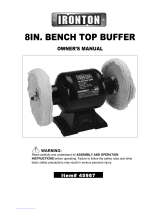
-10-
W1681 (For Machines Mfd. Since 05/19)
OPERATIONS
OPERATIONS
Testing
Once assembly is complete and adjustments have been
made, the machine is ready for a test run. The purpose of
a test run is to identify any unusual noises and vibrations,
as well as to confirm the machine is performing as intend-
ed.
To test run your buffer setup, do these steps:
1. Turn the machine ON by pressing the START button
on the power switch. Be sure to have your finger
poised to hit the STOP button if there is a problem.
2. Once the machine is running, listen for any unusual
noises. The machine should run smoothly with little
or no vibrations.
3. If there are any unusual noises or vibrations, shut
the machine OFF immediately. The machine should
not be run any further until the problems are
corrected.
4. Unplug the machine and investigate the source of
the noise or vibration. Do not make any adjustments
to the machine while it is plugged in.
5. Repeat Steps 1-4 until machine runs smoothly.
Always wear safety glasses when oper-
ating this machine. Failure to comply
may result in serious personal injury.
DO NOT investigate problems or adjust
the machine while it is running. Wait
until the machine is turned OFF,
unplugged and all working parts
have come to a complete stop before
proceeding!
READ and understand this entire instruc-
tion manual before using this machine.
Serious personal injury may occur if
safety and operational information is not
understood and followed. DO NOT risk
your safety by not reading!
General
This machine will perform many types of operations
that are beyond the scope of this manual. Many of these
operations can be dangerous or deadly if performed incor-
rectly.
The instructions in this section are written with the under-
standing that the operator has the necessary knowledge
and skills to operate this machine. If at any time you are
experiencing difficulties performing any operation, stop
using the machine!
If you are an inexperienced operator, we strongly recom-
mend that you read books, trade articles, or seek training
from an experienced buffer operator before performing
any unfamiliar operations. Above all, your safety should
come first!





















